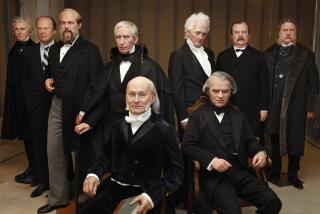Atheist group gives Obama an unenthusiastic nod over Romney
- Share via
There’s been a lot of talk about where faith-based groups stand on the issues and the candidates in the presidential campaign, but not so much about the faithless.
Now the Secular Coalition for America, an advocacy group for atheists, has issued a report card on the candidates that knocks both major party candidates for injecting religion into politics, but expresses a clear preference for President Obama over Republican nominee Mitt Romney.
Romney gets a grade of F overall for stated positions that advocate a lowering of the wall between church and state and that suggest his Mormon faith plays a strong role in his political decision-making. Obama, who professes a Christian faith, gets a C. He gets plus marks for a greater willingness to advocate a separation of church and state but is dinged for bringing prayer into the White House and supporting the inclusion of “under God” in the Pledge of Allegiance, among other heresies (atheistically speaking).
“This score card shows that our current politicians still have a long way to go in protecting the secular values that America was founded on,” said Edwina Rogers, executive director of the Secular Coalition. She referred to a recent report by the Pew Forum on Religion and Public Life.
The report concluded that 1 in 5 Americans has no religious affiliation (although only 6% call themselves atheist or agnostic). “Last week we learned that now nearly 20% of Americans are religiously unaffiliated. Too often we see lawmakers shy away from the nonreligious, but the statistics show that lawmakers can no longer afford to ignore us.”
The candidate who scored the highest, perhaps not surprisingly, was neither Romney nor Obama but Libertarian Party candidate Gary Johnson, who not only advocates the separation of church and state but is quoted as saying that he doesn’t have any churchgoing friends and doesn’t “seek the counsel of God.”
Both Romney and Obama, by contrast, are quoted as speaking about how their faith guides them.
In religious circles, both Romney and Obama have their critics — Romney for belonging to the Church of Jesus Christ of Latter-day Saints, which some evangelical Christians consider to be a cult — and Obama for either his former affiliation with the controversial Rev. Jeremiah Wright or because a significant minority of Americans believe, despite the lack of credible evidence, that he is a practicing Muslim.
None of this especially concerns the Secular Coalition, which dislikes displays of any religiosity in public life, regardless of the denomination or faith.
Among the biggest differences between Romney and Obama — both on the campaign trail and in the Secular Coalition report card — is their position on the Obama administration’s healthcare mandate that will require health insurance plans of some religiously affiliated institutions to include contraceptive services, even if that violates the institution’s doctrines. Romney has vowed to overturn the mandate, which is anathema to the Roman Catholic Church in particular, if he is elected.
The report card relies entirely upon published statements by the candidates, and sometimes fails to grade them when insufficient evidence is available.
The methodology is sometimes curious. For instance, Obama receives a C for his stance on faith-based initiatives and an F for “discrimination by religious organizations receiving taxpayer funding” — another way of saying that he has not stopped religious organizations that receive taxpayer funding from disproportionate hiring among members of their faith. When those two grades are averaged in an overall section on government funding issues, the president receives an overall grade of F for the section.
For Romney, there is no such fuzzy math. F + F = F in anybody’s report card.
mitchell.landsberg@latimes.com
Twitter: @LATlands
More to Read
Get the L.A. Times Politics newsletter
Deeply reported insights into legislation, politics and policy from Sacramento, Washington and beyond. In your inbox twice per week.
You may occasionally receive promotional content from the Los Angeles Times.










